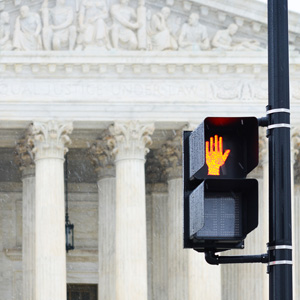SCOTUS refuses to reinstate ban on campaign activities in Ohio that could intimidate voters

Updated: The U.S. Supreme Court on Monday refused a request by the Ohio Democratic Party to reinstate a federal judge’s ban on campaign activities near polling places that could intimidate voters.
Democrats sought Supreme Court intervention after the Cincinnati-based 6th U.S. Circuit Court of Appeals on Sunday overturned a federal judge’s injunction that barred intimidating activities by both presidential campaigns. SCOTUSblog, the Wall Street Journal (sub. req.), Cleveland.com and Politico are among the publications covering the 6th Circuit ruling and the Democrats’ emergency application (PDF) to the Supreme Court.
There were no dissents to the Supreme Court’s refusal to act, but Justice Ruth Bader Ginsburg did issue a statement regarding the denial, Politico reports. Ginsburg noted that Ohio law already bars voter intimidation.
The temporary restraining order (PDF) by U.S. District Judge James Gwin had barred activities such as following or photographing voters, challenging their eligibility to vote, and informing them of the penalties for voter fraud.
Republicans had argued Gwin’s order interfered with the First Amendment right to political speech. Democrats claim that the order is needed to prevent “irreparable harm” to the Ohio Democratic Party, its candidates and voters.
The Democrats also argue the 6th Circuit lifted the injunction without reviewing a response brief from Democrats, which constituted an “extraordinary departure from the most basic requirements of appellate procedure.”



